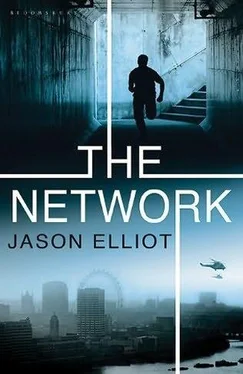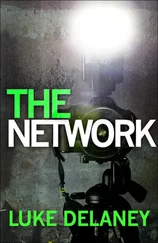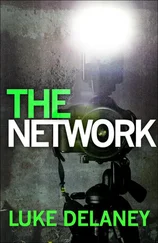Jason Elliot - The Network
Здесь есть возможность читать онлайн «Jason Elliot - The Network» весь текст электронной книги совершенно бесплатно (целиком полную версию без сокращений). В некоторых случаях можно слушать аудио, скачать через торрент в формате fb2 и присутствует краткое содержание. Жанр: Триллер, на английском языке. Описание произведения, (предисловие) а так же отзывы посетителей доступны на портале библиотеки ЛибКат.
- Название:The Network
- Автор:
- Жанр:
- Год:неизвестен
- ISBN:нет данных
- Рейтинг книги:4 / 5. Голосов: 1
-
Избранное:Добавить в избранное
- Отзывы:
-
Ваша оценка:
- 80
- 1
- 2
- 3
- 4
- 5
The Network: краткое содержание, описание и аннотация
Предлагаем к чтению аннотацию, описание, краткое содержание или предисловие (зависит от того, что написал сам автор книги «The Network»). Если вы не нашли необходимую информацию о книге — напишите в комментариях, мы постараемся отыскать её.
The Network — читать онлайн бесплатно полную книгу (весь текст) целиком
Ниже представлен текст книги, разбитый по страницам. Система сохранения места последней прочитанной страницы, позволяет с удобством читать онлайн бесплатно книгу «The Network», без необходимости каждый раз заново искать на чём Вы остановились. Поставьте закладку, и сможете в любой момент перейти на страницу, на которой закончили чтение.
Интервал:
Закладка:
We calculate the length required by multiplying by sixty and dividing by the burning rate per foot. Twenty minutes of burning time will need forty feet of fuse. We check and double-check its length, make sure it doesn’t overlap, verify the position of the circuits and the plastic, and agree that everything looks ready.
‘Pencils,’ he says. ‘Pull them.’
I remove the safety clips and pull the rings in turn. We look at our watches. Then H holds up the end of the time fuse.
‘Got a light?’ he asks, running his hands absent-mindedly over his pockets. I know he doesn’t need one, because there’s already an igniter attached to the end of the fuse. We look at each other for a moment.
‘I insist,’ I say.
‘Allahu akbar,’ he replies, and pulls the ring. There’s a spluttering sound and the fuse bursts into flame. We resist the urge to run, heave on the gates, run the chain through the iron loops and fasten the padlock.
I’m wondering what to do with the key.
‘Keep it,’ says H. ‘Souvenir.’
I wave to Aref, who gives a thumbs up from the cab of the pickup. We climb into the G and lead the way at a good but restrained pace. Then we follow the track to the valley floor, and turn against the slope along the way we came. H is looking ahead and behind us.
‘Let’s get up to that ridge and stop,’ he says, pointing to the spot from which we made our final recce of the fort. We get there ten minutes later. Keeping the engines running we stop and wait for the explosion.
‘Thirteen minutes,’ I say. The other men get out and, taking their cue from us, look back in the direction of the fort.
‘Fifteen minutes.’
‘Wait for it,’ says H, quietly now.
It’s agony. I want to keep my eyes fixed on the fort, but they stray to the surrounding slopes and the valley beyond and then back again, but the explosion doesn’t come. I look at my watch and back to the fort again.
‘That’s twenty minutes,’ I tell H.
He’s running his tongue around the inside of his mouth. Another minute passes.
‘Might be a kink in the fuse cable. Give it a while. The time pencils will kick in in a few minutes.’
We wait. Half an hour passes. The other men begin to talk in whispers. We take the Kite sight and look over the fort in turn. There’s no sign of life. No one can have tampered with the charges. I ask the guards whether there could have been anyone else hiding inside the fort. They shake their heads.
Forty-five minutes has passed. Then an hour.
‘Misfire,’ says H quietly. ‘Fuck it. Let’s go back.’
It’s a depressing feeling to be returning. None of us is very happy about it. The unexpected delay is acting like a silent poison on our nerves. We know we can’t give up on the task, but it’s as if fate itself has suddenly and personally turned against us. I know I mustn’t give in to this feeling, but as we drive up once again under the looming walls of the fort it seems a wounded place, resentful at our having abandoned it to destruction and planning sullenly to punish us in turn.
I retrieve the key to the padlock, pull out the chain, and we heave the gates open. There’s a long scorch mark on the ground where the time fuse has burned. Gently we pull open the second door onto the missiles. Everything is intact.
Carefully, H unties the primary detonator from the detcord and examines it. He hands it to me. It hasn’t fired. The open rim is scorched where the fuse has burned it. It also has a faint but distinct smell, which it shouldn’t have.
‘Wax,’ I say. ‘Smells like some kind of sealing wax.’
We disconnect the time pencils. They’ve fired as they’re supposed to, but the detonators attached to them are intact, as are all the others. H takes a short length of fuse and fits it into the open end of one of them, lights it and stands back. The fuse burns perfectly, but the detonator remains stubbornly inert.
‘These dets are all fucked,’ says H.
The news is particularly bad because the detonator is arguably the most crucial component of an explosive chain, and our plastic explosive cannot be initiated without one.
‘Sattar,’ I say. ‘In Kabul.’
H nods. ‘Crafty fucker. Must have switched them before we left. We’ve been stitched up.’
For a few moments there is only silence. We look at each other. It’s a long way to have come to be thwarted at the final moment.
‘Right, let’s deal with it. Options.’
The other men are lingering on the far side of the courtyard, looking a bit let down but too polite to ask what the problem is. I wave them over, and we explain the challenge and listen to their suggestions in turn.
‘Fire an RPG into the room,’ suggests one of the men.
‘Bollocks,’ says H. ‘That’s suicide. Who’s going to do that?’
Someone else asks whether a piece of detcord, pushed into an emptied 7.62-millimetre round, could be made to detonate when the round fires.
‘Doubt it,’ I say. ‘But you still have the problem of how to fire the round from a safe distance and make it reliable. There are dets in the Stingers, but we’d have to take them apart first. There are dets in the mortar rounds too, but even if we got them out we’d still have the problem of how to prime them.’
‘What about the 82?’ asks H, meaning the Russian mortar. ‘If we can get it up on a ridge we can drop a round right through the roof of the room. We could drive it up, past where that APC is.’
I translate the idea to the others. Firing an ageing Soviet mortar into the fort from a distance isn’t the most reliable solution. H is silent for a few minutes, and the men break into a heated discussion. Turning away from them, one of the guards puts his hand gently on my forearm to get my attention.
‘Ba motor bala rafte nemishe,’ he says, shaking his head. ‘You can’t drive up there.’
‘We have a motor that can get there,’ I reassure him.
‘No,’ he says, ‘it’s not that. You can’t go up there because of the mines. Mayeen hast.’
‘What kind of mines?’
‘Big Russian ones,’ he says, his hands describing a plate-sized circle. ‘They’re for tanks. From the time of the jihad. I can show you where they are if you want.’
It’s a long shot, but we’re getting accustomed to long shots. Any Soviet anti-tank mine will contain a powerful detonator. If it’s a TM-type mine, which is the most common, it won’t be difficult to remove and attach to our own explosive chain. We agree that we have to try. If the effort fails, we’ll bombard the fort from a distance with the 82, and keep firing until something happens.
Hunting for the mine itself isn’t dangerous. At least at first it isn’t. Anti-tank mines have an actuation pressure of a hundred kilograms or more, so a single man’s weight can’t set one off. The danger comes when you try to move one from its original position. There’s no way of telling whether the mine has been booby-trapped by another, smaller mine laid beneath it, which actuates when the main mine is lifted, setting both off. In some mines there’s even an extra fuse well underneath or on the side, made for an anti-lift device, which will detonate if it’s moved. There’s a charge of several kilograms of TNT in most anti-tank mines, so the prospect of failure is at least unambiguous. The blast will kill us all.
The guards stay in the fort. We work four abreast on our knees, probing the ground at intervals of a few inches while Sher Del acts as a kind of marshaller a few yards ahead of us, keeping us in line. A thin metal rod with a pointed tip is best, but we’re using what we’ve got: one knife, a long bayonet from the guards’ machine gun and the oil dipsticks from the G and the pickup, which are improbably ideal. Glancing across at the others I can’t help feeling it’s a strange symmetry of fate that they are professional mine clearers, and that’s exactly what we’ve ended up doing to save the operation. I’m glad it’s them.
Читать дальшеИнтервал:
Закладка:
Похожие книги на «The Network»
Представляем Вашему вниманию похожие книги на «The Network» списком для выбора. Мы отобрали схожую по названию и смыслу литературу в надежде предоставить читателям больше вариантов отыскать новые, интересные, ещё непрочитанные произведения.
Обсуждение, отзывы о книге «The Network» и просто собственные мнения читателей. Оставьте ваши комментарии, напишите, что Вы думаете о произведении, его смысле или главных героях. Укажите что конкретно понравилось, а что нет, и почему Вы так считаете.












